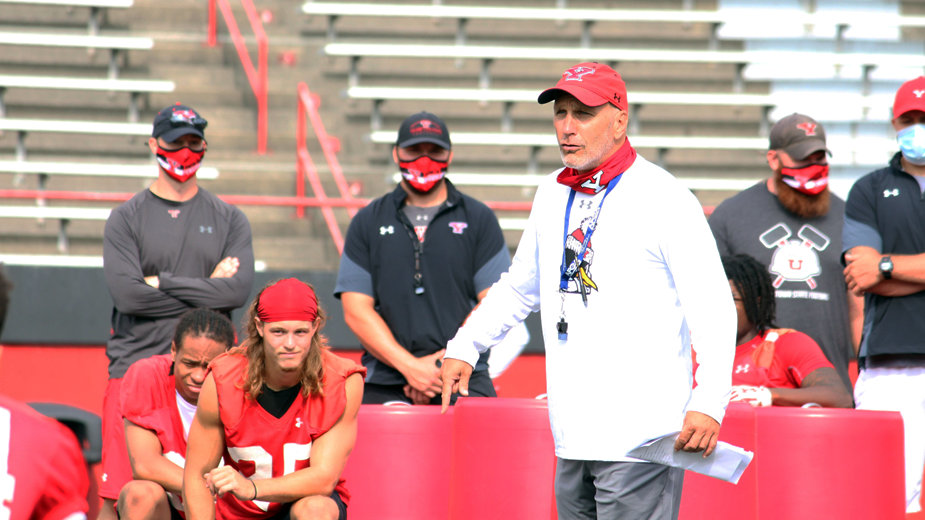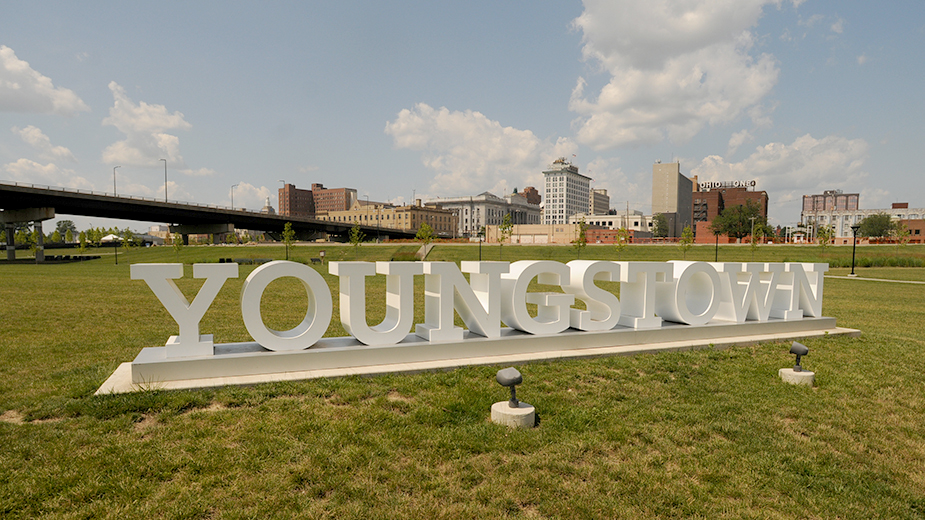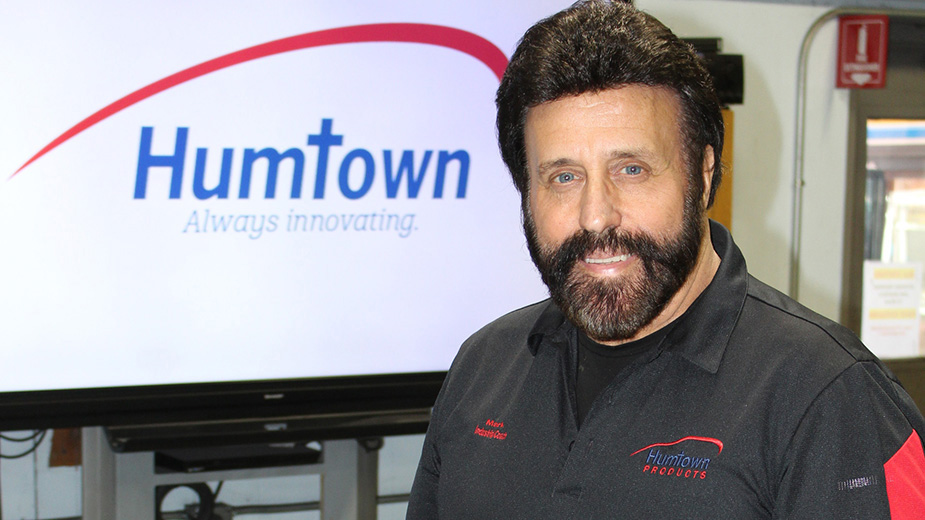With Football Season on Ice, Penguins Are All In
YOUNGSTOWN, Ohio – Since Sept. 4, 1982, Saturdays at Youngstown State University have been filled with the sounds of whistles blowing, pads cracking and music blaring. Spectators weave their way through Stambaugh Stadium’s concrete infrastructure to watch the YSU football team.
This fall, because of COVID-19, the stadium on the northern end of campus will be silent. The YSU football season won’t kick off until spring at the earliest when it’s scheduled to open play in the Missouri Valley Football Conference.
Football has officially been put on ice at the “Ice Castle.” It marks the first time YSU hasn’t fielded a football team in the fall since 1945, when it returned after a three-year hiatus because of World War II.
YSU announced Aug. 17 that it was forgoing the nonconference portion of its schedule. On Aug. 7, the MVFC decided to split football into a nonconference fall season and conference play in the spring.
“It’s going to be weird,” senior running back Christian Turner says regarding the cancellations. “I’m not looking forward to it. It’s just what has to happen at this time, honestly.”
Receiver Jake Coates spent his time at Warren JFK High School working for a chance to play college football. However, he and the team’s 12 other seniors will have to wait to start their senior season at YSU.
Coates and his teammates were working toward another college football season when the decision was announced, one week into fall camp. Ron Strollo, YSU director of intercollegiate athletics, says the university wanted to see how the first week went before reaching a verdict.
There was hope for fall sports when the NCAA paused all athletics in March, giving colleges a five-month gap until play was scheduled to begin. But optimism turned to concern as the weeks passed.
Now, the college football world is fracturing as schools across the country postponed their fall athletics until next spring. In total, all but about 100 of the NCAA’s 1,268 members have suspended fall sports, with only the largest schools holding out hope.
“Nobody knows what’s going on, but like I say, we’re taking it day by day. And whoever comes up, we’ll be ready to play,” junior defensive end Antoine Cook said during the week of practice before games were canceled.
Football is full of risks. Muscle injuries, broken bones and concussions are part of the sport. However, Turner said the risks of playing football should be kept separate from the risk of contracting the virus. In the Big Ten Conference, for example, 10 players who tested positive for the virus were later reported to have myocarditis – an inflammation of the heart – as a result of their infection.
“It is very risky to try to play,” Turner says.
The virus forced YSU to lay off 69 employees, cutting 22 positions from the athletics department, about a quarter of its staff, Strollo says. Some, he says, were already vacated positions as a result of coaches and administrators leaving following their respective seasons. Others weren’t as lucky.
“We spread the pain throughout all our different administrative areas and sports,” Strollo says.
The decision resulted in an approximate $2 million in cuts to the YSU athletics department in May. The cuts were a result of calculated predictions and repayment to students for on-campus expenses.
According to Strollo, the cuts took into account canceled games. However, he says a lack of sports also creates a lower operating cost.
“When you cancel sports and not competing, you’re saving money on travel and paying officials and a variety of other areas,” Strollo says. “We had already saved about $300,000 or $400,000 in summer school expenses by not having all of our student-athletes here.”
The YSU football team would have opened the season against the University of Akron on Sept. 5. The Zips were supposed to pay YSU $300,000 in the first meeting between the two former rivals since 1995. YSU would have spent roughly $300,000 for Duquesne University and Eastern Kentucky University to play at Stambaugh Stadium, but those games were also canceled.
Strollo says he might look into rescheduling Akron but YSU’s schedule is booked through 2028.
Since the schedule is no longer an issue, the loss of tickets and loge sales is a concern. In the university’s fiscal year 2021 operating budget, the athletics department estimated $375,000 of revenue from football ticket sales.
Athletics also lost $329,702 allotted from the university’s general fund. The department is still expected to receive $2.7 million from the fund.
“We’re hoping that come spring that we can have some fans in the stands. Obviously, our suite holders will be able to take advantage of their investment,” Strollo says.
The university also has to settle the nerves of its athletics sponsors, who were already prepared for 2020 fall athletics.
Strollo says the university has maintained communications with advertisers and will update them when new information becomes available.
“I think you just look at it as one long season,” Strollo says regarding advertising. “That’s how we’re looking at it. Instead of us getting done in 11 or 12 weeks, it’s going to be nine months.”

The university will also have to take into account potential equipment changes. Strollo says the university has purchased Schutt “Splash Shields” and masks to wear inside of the players’ helmets.
Riddell, one of the country’s largest football helmet manufacturers, decided to forgo development of helmet face shields. The manufacturer supplied 60% of NFL helmets in 2017, along with 90% worn by college players, including those at YSU.
Schutt, another helmet manufacturer, and Oakley, which manufacturers football visors, developed face shield models. The models attach to and run the length of the facemask to help prevent spreading COVID-19.
According to the NCAA’s “Resocialization of Collegiate Sport: Developing Standards for Practice and Competition,” face shields are recommended instead of masks to prevent issues with heat and communication.
“Between the two, we’ve been testing both of them out to figure out what’s best,” Strollo says. “But our athletes will be using one or the other.”
Player safety is the main concern. The players’ future is another.
Strollo expects the NCAA to make a ruling on athlete eligibility. He thinks the NCAA will consider a once-in-a-century pandemic an abnormality and grant extended eligibility for student-athletes. On Aug. 19, the Division I Council voted to allow athletes in fall sports to keep their eligibility, regardless of how many games they play in a resumed season. The measure still must be approved by the NCAA Board of Governors.
First-year head coach Doug Phillips says his staff took players’ perspectives into account before making the camp schedule.
Practices were split into offense and defense, with the defense working out in the morning and offense taking the field later.
“I know we’ve got to build a team And we’re going to continue to do that. But I think you got to look at each individual and have a separate plan, making sure that they’re comfortable, whether it’s coming back on the field or even coming back to school,” Phillips says.
Players would obviously like a normal season. The thought of a stoppage, however, because of the virus is frustrating, Coates says.
“Everyone’s trying to react to it and handle it in different situations,” he says. “[Phillips] makes five different schedules every day because you never know what’s going to happen.”
The lead-up to the next football season has been a rollercoaster ride so far; but YSU defensive back Zaire Jones says the team has put in work to take the field during the 2020-21 academic year.
“At first we were excited [to start spring camp] and then it went to disappointment and then that disappointment went to caring for each other,” Jones says. “Once we learned to care for each other, morale was built throughout the team. And now we’re able to use that camaraderie as a unit.”
It will take some time before the Penguins can use that camaraderie.
For now, the team will continue to work toward Week 1 – whenever it may be played.
Copyright 2024 The Business Journal, Youngstown, Ohio.


